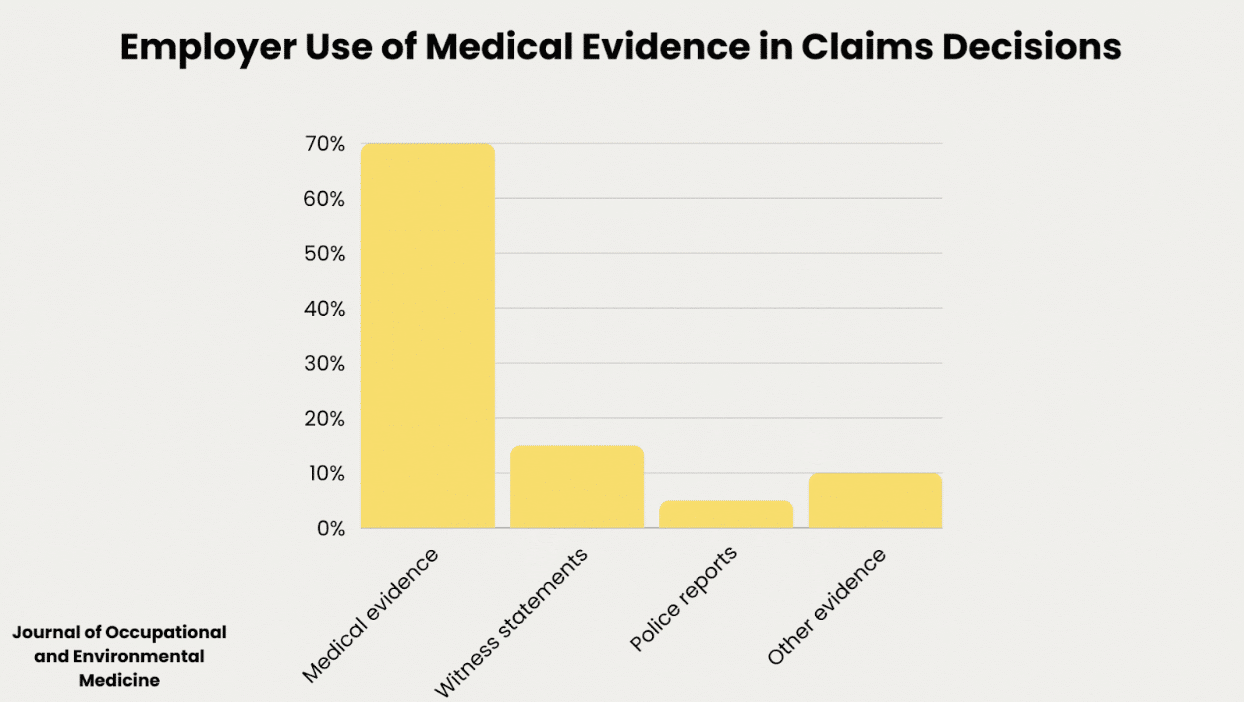Workplace injuries occur at an alarming rate. Over 2.8 million nonfatal workplace injuries and illnesses were reported by private employers in 2019 according to the Bureau of Labor Statistics. Fortunately, workers’ compensation laws provide a safety net for injured employees.
But navigating the intricacies of the system can be challenging without proper guidance. An experienced workers’ compensation attorney can empower employees to obtain fair compensation and successfully navigate the compensation claims process after a workplace injury.
Legal counsel for workplace injuries helps protect employees’ rights and maximize benefits for workplace injuries.
Understanding Workers’ Compensation
Workers’ compensation provides medical care and wage replacement to injured employees. It does this regardless of fault. It is a form of insurance that nearly all U.S. employers must carry. It covers costs related to on-the-job injuries and illnesses. Under workers’ compensation laws, employees give up the right to sue their employer. In exchange, they receive assured benefits.
Rules around workers’ compensation vary by state, so connecting with a Los Angeles workers compensation attorney who is well-versed in local statutes ensures following proper protocols. Each state oversees its own workers’ compensation system under state statutes and regulations. They decide who must be covered and what counts as a work-related incident.
They also set the levels of wage replacement rates and durations of benefit eligibility. Workers’ compensation claims cover injuries resulting in disabilities lasting over 3-5 days. Coverage includes medical evaluations, hospital services, physical rehabilitation, and specialty treatments. It also covers prescription medications and assistive devices. It includes lost income and death benefits for surviving dependents.
The Benefits of Legal Representation
Hiring skilled attorneys touts many advantages in handling claims. They have extensive legal knowledge and vast procedural experience. This helps prove eligibility and maximize compensation. Lawyers summarize records, communicate with insurers, complete filings, negotiate disputes, and expedite resolution. They do this so clients can focus on recuperating.
Statistics show legal representation nets injured employees 25-30% higher compensation versus self-guided claims. Given that the average weekly wage replacement currently exceeds $1,100, that bump proves substantial. Attorneys also ensure full medical reimbursements for treatment, prescriptions, and assistive devices.
Individually, these may seem small. Together, they provide significant support for long-term care needs arising from severe injuries. Overall, lawyers simplify convoluted processes and minimize delays in securing rightful benefits.
Tips for a Winning Claim
Unfortunately, even with strong evidence over 60% of claims see initial denials. Meticulous documentation and prompt reporting increase approval odds. Employees should take actions like:
Immediately notify supervisors and document all injuries in detail. Delays can jeopardize claims.
Specify work factors causing injuries when filing official paperwork.
Keep careful records of medical evaluations and expenses.
Consult with knowledgeable legal counsel to understand rights.
Leveraging Medical Evidence
Robust medical documentation makes or breaks claims. Approximately 70% of adjusters who determine benefits cite injury evidence as their primary factor. The fullest proofs linking diagnoses to workplace events translate to higher approvals. Strategically leveraging medical evidence includes:
Early photography captures visible trauma sustained onsite before healing occurs. Annotated diagrams map injuries, and contemporaneous writing details acute symptoms. All help cement eventual clinical findings.
Reports by treating physicians diagnose medical conditions. They also correlate specific work-related accidents with symptoms upon examination. They also outline recommended care regimens and prognosis ongoing side effect risks. These reports carry tremendous weight, especially when from specialists.
Expert analyses interpret how chronic conditions impair functions. They also prevent the resumption of pre-injury work in original roles. Necessitating long-term disability provisions, they boost support for permanent damages exceeding temporary harms.

Strategic Communication
Effective communication facilitates employee empowerment by helping workers’ compensation attorneys protect staff rights amid any disputes over appropriate injury compensation entitlements. Useful approaches include:
Before leaving worksites, you must report on-site injuries to managers per official protocols. This jumpstarts processing and investigation.
maintaining dated paper trails verifies information movement across stakeholders. Formal printed letters better prove transfers than plain emails.
Lawyers advise optimal messaging strategies amid disputes. Legal guidance maximizes outcomes when tensions arise over benefits.
Expressing desired timeframes and reimbursement types facilitates mutual understanding rather than waiting indefinitely.
Overcoming Roadblocks in Claim Processing
Despite proper protocols, obtaining work injury benefits still meets roadblocks like:
Adjusters often reject specialist referrals, procedures, devices, and medications. They say costs are not medically justified. Appeals typically must force approvals.
Compensability disputes often arise from gradual ergonomic strains, not singular accidents. Insurers often challenge the employment relation despite causation.
Payment Delays: Even undisputed claims commonly face administrative payment backlog delays of months. Legal involvement prevents exploited waiting.
Over 50% of claims are disputed eventually. Leverage attorneys’ skills to fight mistreatment. Their identification of unjust insurer tactics empowers injured staff.
Appealing Denied Claims
Claims may be denied due to disputes on work ties, lack of medical proof, or process technicalities. Quick appeals aid in overturning bad rulings. The appeals process has strict evidentiary and deadline demands. You challenge rejections through hearings pleading your case to judges.
Legal help is currently vital. According to a California study, attorney-guided appeals have higher success rates. Only 13-15% of claims go to courtrooms nationwide. But, those that do not have greater awards with lawyers. Representation employs litigation tools. These include deposing witnesses and securing expert testimonies. They also involve presenting medical justification studies and arguing legal nuances. Overall, experienced lawyers empower employees to rightfully claim the compensation they deserve.
Frequently Asked Questions
What recourse exists if my claim gets denied?
You can appeal within a strict window which varies by state. Timely lawyer involvement greatly aids in navigating procedural necessities. It helps overturn unjust denials through hearings or binding mediations. The lawyer advocates for your entitlement to benefits.
How soon after filing a claim do checks start arriving?
Timeframes differ based on governing structures. Some states issue temporary disability checks within 14 days of claim determination. Permanent disability payouts take months longer. Expediting documentation shortens durations. Attorney assistance accessing your entitled compensation speeds payment arrival.
Who makes determinations on appropriate medical treatment for my injuries?
Authorized company clinicians make initial treatment decisions. Employees can request second opinions or specific specialized care through proper evidentiary channels. Experienced lawyers facilitate ensuring you receive clinically recommended recovery care.
Final Remarks
Suffering from a workplace injury already brings substantial stress. An experienced workers’ compensation lawyer can empower you. They limit confusion and expedite the resolution of your claim. With proper guidance, individuals can focus their energy on recovery. You won’t need to wrestle with regulatory nuances. With these strategies, you can navigate the workers’ compensation system and overcome its challenges.
Published by: Martin De Juan









